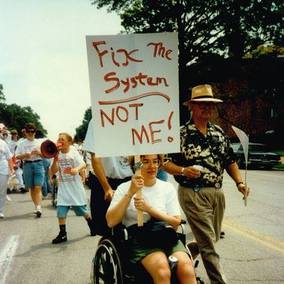The sound of my voice is different, but there is nothing about that difference which makes it inherently bad or unfortunate. It is only because our society has labelled difference as disorder, stuttering as ugly and unwanted, that my voice becomes a medical or pathological problem to treat.
The idea that our society rather than my body lies at the heart of my struggle—that I should spend my time fighting discrimination rather than wrestling my body to be more fluent—has been treated by many as absurd.
It’s simply taken as obvious that stuttering is a bodily defect rather than a social issue.
But back up to the beginning of speech correction in the early twentieth century, and look at the way many of its proponents framed this supposed defect:
- “There is an essential economic need for speech-correction work. Unless these speech defectives can be retrained so that they will be able to fill an appropriate place in the industrial and professional world, society will continue to suffer an economic loss because of them.”1
- “Recognizing the social economic value of speech, it is patent that the attainment of fluent unimpaired habits of speaking represents a distinct gain to the community. The value, therefore, of speech correction would be represented by the saving to the community of expenditures now involved as a result of existent or future speech defects.”2
- “The Government has recognized this menace by refusing to permit immigrants who stammer to enter the country, because of the great probability of their becoming public charges.”3
- “Miss Wells discussed the role of the speech correctionist in the unifying of public sentiment and the promotion of Americanism through the elimination of foreign accent, thus bringing about a more homogeneous American speech.”4
- “Each inarticulate citizen is a weak spot in our defense against un-American propaganda and in our development of efficient democratic procedures.”5
- “The War Committee of this association found that able young men were handicapped in the discharge of the military obligations of citizenship, were unable to qualify for commissions because of voice and speech defects.”6
- “If nothing is done to correct their condition, thereby establishing mental stability, what is the result? Such children help to fill up our vast army of truants, delinquents, vagrants, and gangsters. From a weak, good-natured child is evolved a child on the road to criminality.”7
- “It is not by chance that the incidence of speech defects is higher in penitentiaries than anywhere else except in the institutions for the mentally deficient.”8
- “‘Living at the tips of one’s nerves’ through an impediment of speech tends to develop vicious circles of nervous instability resulting in an increase of criminals, prostitutes, and general failures.”9
- “Plans are under consideration whereby the board of education will provide in the very near future for its thousands of children suffering from defective speech, thus wiping out all handicaps and setting a standard for normal American children.”10
The quotes could go on for pages upon pages.
The point is, stuttering was regarded as a medical defect to fix precisely because it was a social problem.
Education, medicine, psychology, and speech pathology all turned their attention to developing treatments for abnormal speech precisely because it posed a problem to society. It cost society money. It damaged national unity and identity. It could lead to moral degeneracy and criminality.
From the very start, the “medical model” grounded itself in the social. The treatments developed to fix dysfluent speech didn’t legitimize themselves on the objective “fact” of our pathological condition; they legitimized themselves by showing they were providing a social service. “Facts” always come second.
So when I say that stuttering is a social problem, I am not saying anything groundbreaking. I am saying the same thing speech correctionists themselves claimed as a basis of their discipline. When I go on to say that the reaction to stuttering should therefore be to change society rather than to change my body, I am not rejecting a somehow obvious “truth” that my body contains a pathological defect. I am rejecting the brief interlude medicine, science, and psychology have offered in reaction to the social problems caused by stuttering. I am suggesting we back up, look at the world that refuses to accept us as we are, and make the cultural changes that should have been happening all along.
My voice was treated as broken precisely because society was structured to exclude it. It’s time to fix that. Not me.
-------------------
1 Charles Van Riper, a pioneering speech correctionist described as having had the most influence of any speech-language pathologist in the field of stuttering, in “Speech Correction: Principles and Methods,” 1939.
2 Dr. Ira S. Wile, Physician and commissioner of Education in New York City, in “The Economic Value of Speech Correction,” 1916.
3 Frederick Martin, of the New York board of Education, in “Stammering,” published in the Quarterly Journal of Speech in 1919.
4 Recorded by Katner in “The Speech Clinic as a Social Agency in National Emergencies,” describing a symposium at the convention of the National Association of Teachers in 1940.
5 M. R. Traube, Dean of the School of Education at Pennsylvania State College, in “Coordinating Professional Responsibilities in Speech Correction and Speech Education,” published in the Journal of Speech Disorders, 1941.
6 Edward Charles Mabie, head of the State University of Iowa Department of Speech, in “Opportunities for Service in Departments of Speech,” 1920.
7 Dennis J. McDonald, Fellow of the Academy of Medicine, New York, in “Speech Improvement,” 1916.
8 Avis. D. Carlson, an American writer, in “Crippled in the Tongue,”1937.
9 James Sonnett Greene, M.D., Director of the New York Institute for Speech Defects, in “The Mission of the Speech Specialist,” 1916.
10 Again, Dennis J. McDonald, Fellow of the Academy of Medicine, New York, in “Speech Improvement,” 1916.





 RSS Feed
RSS Feed
